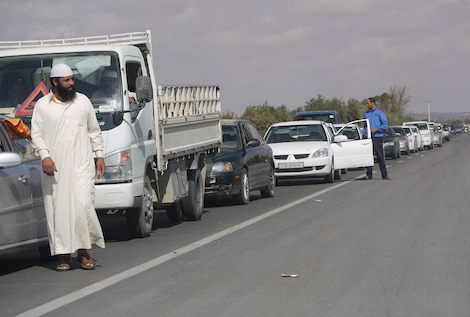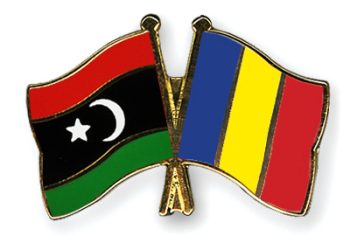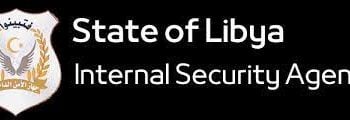By George Grant.

Bani Walid, 25 October:
Thousands of refugees were prevented from returning to Bani Walid today by members of the Libya . . .[restrict]Shield brigade who insisted the town had not yet been fully secured.
This morning, the Libya Herald was able to enter Bani Walid before being stopped at a closed checkpoint some one-and-a-half kilometres inside. Brigadesmen manning the post said that house-to-house searches were still being conducted and that the town was not safe to enter.
The occasional thump of RPGs could be heard in the distance, interspersed by sporadic machinegun fire.
“Don’t trust them! Don’t let them through!” shouted one of the guards, as a small trickle of civilian vehicles arrived at the checkpoint and attempted to pass. “We found 20 Kalashnikovs in a sheep pen yesterday”, the soldier continued, inferring that Bani Walid residents could use hidden weapons to resume the fighting if allowed home.
Heading back out of Bani Walid a short time later, a second checkpoint was found hastily established on the edge of the town, and manned by the same calibre of ill-disciplined youths as before. In front of them was an enormous convoy of civilian vehicles, backed-up down the road, which the soldiers were refusing to let pass.
As tempers rapidly frayed and yelling began, one soldier pulled out a pistol and pushed it through a car window into a passenger’s face before firing in the air.
Moments later, a hail of 14.5mm bullets thundered over the heads of the crowd, sending terrified civilians, including children, running in every direction. With the road ahead near-blocked by cars and panicked people, the Libya Herald was almost prevented from leaving as one young man reached through the car window and attempted to rip the keys from the ignition.
A group of angry residents was found a little further out of the town complaining that they feared for their possessions if not allowed home, and had to return today to prepare for Eid Al-Adha, which begins this evening.
“We heard on the television yesterday that we could return home for Eid”, said one man, who did not wish to give his name.
“Our government says go back, so I figure how to go back”, said another. “I am so angry. I am without a gun, but if I had one, I would have gone to shoot those people. These people who enter Bani Walid are going to steal from us. We need to go back. We need our children to be happy at Eid.”
By late morning, hundreds of families were making the journey back towards Bani Walid, with soldiers at a checkpoint close to Tarhuna waving them through, apparently oblivious to what lay ahead. Shortly before 14:00 this afternoon, it was reported that the soldiers closing off the town had relented in the face of a deluge of returning refugees, with some residents, although not journalists, being permitted to re-enter.
Well over 25,000 people are believed to have fled the recent conflict inside Bani Walid, although the true figure may well be far higher. Few of the homes seen inside the town today showed any sign of life at all.
The town was officially declared liberated yesterday by Chief of Staff General Yusuf Mangoush, although he warned that pockets of resistance still remained.
Several hundred people are reckoned to have been killed or wounded in the fighting, but with Bani Walid hospital still closed to the media and the phone network down, a precise figure remains impossible to obtain at present.
With the main conflict over, the government has announced the creation of three emergency committees to deal with security, the resumption of essential services and the return of refugees to Bani Walid.
Just how effective these committees will be in addressing the practical needs inside the town remains to be seen, and their work will likely be made more difficult by the profound resentment still found amongst many citizens there, who believe they have been the victims of collective punishment.
The rationale for the assault on Bani Walid, which together with its environs is reckoned to be home to some 80,000 people, was the enforcement of Resolution No. 7 of the National Congress. That resolution demanded the town hand over a number of people wanted for various crimes allegedly committed in the name of the Qaddafi regime and was triggered by the death of Omran Shaban on 25 September.
Security forces are said to have a list of around 1,000 names wanted for arrest, including several members of Khamis Qaddafi’s infamous 32nd Brigade. Yesterday, government spokesman Nasser Al-Manaa said that more than 100 individuals, amongst them members of the Khamis Brigade, had been arrested to date. [/restrict]









